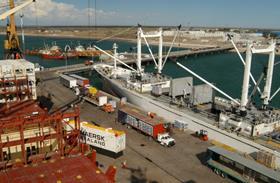
The strike at the Chilean Port of San Antonio is continuing to cause serious headaches for the country’s fruit export trade, according to local news reports.
The Chilean Fruit Exporters Association (Asoex) claims operational costs are running at close to US$6m per day due to the logistics and shipment standstill, and expects a total loss of US$50m.
The organisation is particularly concerned about 2.3m cartons of fruit destined primarily for the US and South Korea which may not make their respective marketing order deadlines.
According to the Federation of Fruit Producers (Fedefruta), up to US$60m-worth of apple, plum and table grape shipments (destined for Europe, Korea, Mexico and the US) run the risk of being delayed.
Fedefruta president Cristián Allendes explained that if fruit destined for South Korea does not leave by Wednesday (3 April) it will not arrive in time to comply with the marketing order for Chile.
In terms of US-bound fruit exports, Allendes assured that they had just left and would meet the marketing order deadline, after over 200 trucks were sent to the Port of Coquimbo to handle the shipment.
However, he said that 90 containers (containing 200,000 cartons) worth US$12m, which have been held up for 10 days at San Antonio, will not make the US deadline.
Asoex has joined with other organisations in expressing its concern for the situation, according to a report by Diario Financiero.
Asoex president Ronald Bown said the situation is “unacceptable”, explaining that there is “nothing that justifies the immense damage it is producing”.
Bown added that the situation is becoming even more serious considering that those affected are the small and medium producers who depend on the season for their livelihood.
According to Asoex, an extraordinary board meeting will be held today (Tuesday 2 April) to analyse the legal options available to resolve the situation.
Chile’s National Agriculture Society (SNA) is apparently calling on the government to apply article 11 of the State Security Law to reinstate normal trading operations.



